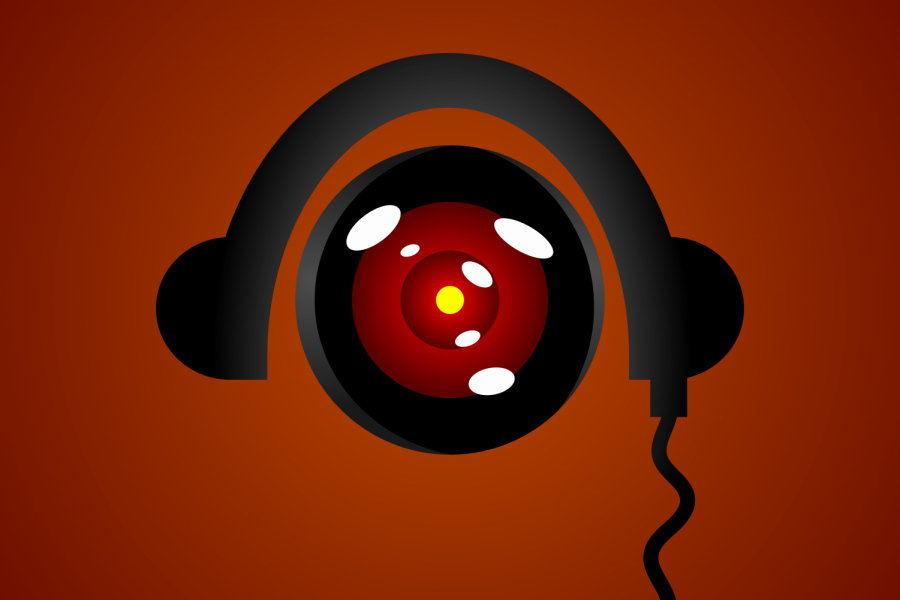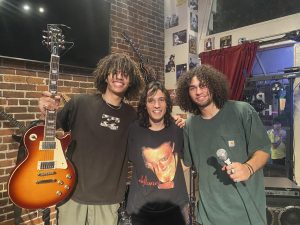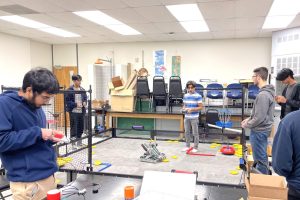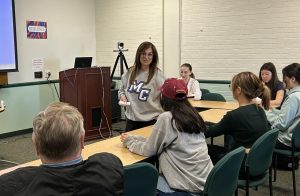Artificial intelligence will replace human musicians
Artificial intelligence (AI) is moving rapidly towards having the capacity to produce convincing computer-generated original music. And AI music mastering companies like LANDR may eventually push out human mastering engineers, as music producers begin to adopt the less expensive AI mastering services. Photo credit: James Schaap
October 22, 2017
Soon, all of the music you hear will be made by computers, not humans.
Many of you have seen the Terminator movies from the 1990s – machines, driven by Artificial Intelligence (AI) computers, take over the world, and fight wars against the very humans that programmed them.
This vision of technology originally seemed like a far-fetched science fiction concept. However, today, AI poses a very real threat to humans, industries, and civilization. Up and down the line, from jobs, to automation, to the Internet, AI is permeating and impacting all of our lives on a daily basis.
The music industry is an industry already feeling the impact of AI. It is already taking away work from humans. As it advances, AI will eventually eliminate the need for human songwriters, composers, and engineers.
Consider this fair warning and reality check to anyone considering a career in music; there will be no more careers in music – no songwriters – no composers – no engineers. These jobs will become automated.
It is already happening.
After the recording process ends, songs and musical compositions undergo a process called mixing and mastering, which is done by human beings. These specialists listen and make adjustments to volume, tone, clarity, equalization, and overall sound. These same humans ensure that the final product is ready for broadcast on radio, TV, film, and streaming.
Computers are now being programmed to do these tasks efficiently, at significantly lower costs and without the need for a human at all. It is literally drag and drop – and poof – the song is mastered and broadcast ready.
Aditya Kaul, the research director at the AI focused research firm Tractica noted that AI has already entered the mastering market and affecting professional audio engineers.
“Professional audio engineers are likely to be impacted by the advance of AI, said Kaul. “Companies like LANDR can already do professional grade audio mastering.”
LANDR is an online AI mastering service that charges a subscription of $40 per month for unlimited high resolution mastered tracks. Human mastering services charge anywhere from $70 – $300 per song. Who would pay a human mastering engineer those kinds of prices when you can master hundreds of songs and musical works using AI, for $40 per month?
It doesn’t end there. Artificial Intelligence is also generating music that is already being used in advertising, film, and TV. In the past, a human composer would be contracted to create custom music for a specific commercial or film. Sometimes a songwriter would create a custom song for a commercial. Tractica’s Kaul confirmed paid work is already being diverted to AI.
“AI music companies like Jukedeck and Amper are already going after the low hanging fruit, like YouTube content, where people can’t afford to pay or license.”
According to Kaul, AI has the potential to be able to produce songs that end up on the charts.
“In the long run, you are very likely to see AI music being sold commercially and possibly getting onto the charts.”
Any songwriter should take heed of Kaul’s forecast. If AI can produce songs that are commercially viable, and able to get onto a Billboard chart, then there will be no room for human songwriters, and no need for record labels to pay royalties for songs written by humans.
Don’t kid yourself; AI can already produce some extremely convincing musical works. It is already being tested in focus groups.
Musicstats.org conducted a study from May through August of 2016. Fifty German millennials were divided into two groups of 25 participants each, and played a song created entirely by AI. The researchers told the first group that the song had been written by a composer who had suffered a family loss. The second group was informed, up-front, that the song was created by AI.
No statistical differences were reported between the two groups.
It appears millennials, at least in this study, will listen to AI music, and don’t find any noticeable faults with the emotional or technical qualities of the music.
This is a wake up call! If listeners can’t tell the difference between AI music and music created by a human, then ultimately the computer music will achieve the same level of listenership and completely dilute the music that is being broadcast.
Record labels and production companies will not have to pay licensing fees, royalties, residuals, or any kind of income, because they will have their own computers to create the music, and they will own the intellectual property outright. They will own the act of music creation, instead of having to rely on humans to create for them.
The German study also highlights the challenges for people that are considering a career in music creation: If a music publisher needs formulaic hit songs, or if a Youtube content creator can’t afford to license music, or if an advertising agency doesn’t have a budget for a composer on a commercial, then the least expensive alternative, AI, will be more than sufficient.
Michael Carey, an award-winning composer, hit songwriter, and producer, has had a prolific 25-year music career, and witnessed the evolution of the music business. He is wary of AI.
“This will be a major step toward the already significant trend of commoditizing creative content…by making a virtually endless supply of instant, effortless, ‘programmed-to-order’ content available,” said Carey. “AI-based music creation will hasten the ‘race-to-the-bottom’ that composers, songwriters and producers are already experiencing as music is increasingly de-valued.”
In the future, songwriters, composers, and engineers will have very limited roles. Eventually, record labels and companies like Youtube will have their own artificial intelligence machines. These “music boxes,” will be able to churn out original music that sounds like a hit. Then. they can do away with humans and the whole concept of intellectual property and music licensing.
In fact, it is possible that copyright wars will be waged – not human to human, but between company “music boxs.” It is not hard to then visualize live courtroom drama with a record executive sitting on stand with his “music box,” and getting cross-examined by a computerized musicologist, trying to determine if one computer generated song has a similar melody, harmony, and rhythm that infringes on another.
All this to say that humans will eventually be out of the business of writing songs, composing music, and engineering recordings.









Bart • Sep 3, 2018 at 3 -07:00.09.
Hopefully I won’t live to see or hear that. The one thing a machine won’t be able to mimic is the soul in music. (I’m not talking about the modern pop/rap/whatever-crap obviously, that never had a soul to begin with) According to this: https://freeyourmusic.com/blog/ai-music/ we have so much more time to enjoy real humans at work 🙂